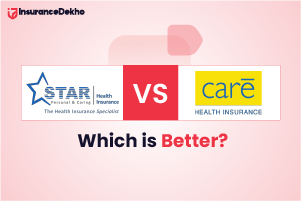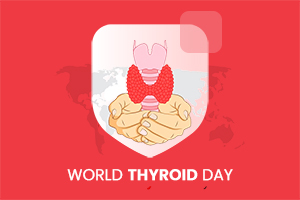

- Tax BenefitUp to 75000**
- Claim SupportEveryday 10AM-7PM
- 45 Lacs+Happy Customers
*Standard Terms and Conditions Apply.
**Tax benefits are subject to changes in Income Tax Act.
Blindness refers to the complete partial loss of vision, or the inability to see anything. Partial blindness, for example, may involve the ability to see blurry shapes or some light, whereas complete blindness refers to the total loss of vision and no ability to see anything, which would also include the ability to see light. Blindness can occur in one eye (unilateral blindness) or both eyes (bilateral blindness). It is diagnosed by testing the visual acuity of each individual eye.
Blindness
Causes of Blindness
Causes of blindness can be infectious, or caused by injury, or symptoms of other conditions. There are also various risk factors which increase the likelihood of blindness occurring. The causes of blindness are listed as follows:
- Glaucoma
- Macular degeneration
- Traumatic injury
- Trachoma
- Leprosy
- Herpes
- Vitamin A deficiency
- Retinopathy of prematurity
- Stroke
- Infectious diseases of the cornea or retina
- Ocular inflammatory disease
- Retinitis pignemtosa
- Chemical poisoning
In addition to these common causes of blindness, there are certain risk factors which heighten the risk that blindness may occur. These are:
- Poor prenatal care
- Premature birth
- Age
- Poor nutrition
- Poor hygiene
- Family history of blindness
- Smoking
- Cardiovascular disease
Symptoms of Blindness
The common symptom of blindness is some difficulty experienced in seeing. The ability to cope with the loss of vision may depend on when in life the vision loss has occurred, for example, if one loses the ability to see later in life it may be difficult to adjust to the non-seeing world whereas if somebody is born blind the adjustment for the individual is not required. The sudden loss also worsens the ability to adjust as opposed to gradual loss of vision over time. Depending on the cause of blindness, other symptoms may differ.
If blindness is caused by a cataract, the pupil may appear white instead of black. In blindness which is a result of an infection of the cornea (the film covering the eyeball), a grey or whitish film may cover the eye, making it difficult to see through to the coloured part of the eye (the iris). The following are some other common signs and symptoms of blindness:
- Discomfort in the eyes
- Awareness of the eyes
- Foreign body sensation
- Pain in the eyes
- Discharge coming from the eyes
Prevention of Blindness
Depending on the cause of blindness, it is preventable in many cases. Blindness, when caused by traumatic injury, can usually be prevented by the use of proper eye protection. Here are some other tactics of prevention based on the concerned cause:
Blindness caused by nutritional deficiency can usually be prevented through a balanced and healthy diet.
When caused by glaucoma, it is often possible to prevent blindness when the glaucoma is detected early and appropriately treated.
Another common cause is infectious diseases, in which case public health measures play a part in preventing the spread of the disease and thereby preventing the contraction of the symptom of blindness.
Blindness caused by diabetic retinopathy can often be prevented by avoiding smoking, controlling blood sugar levels through diet and other measures, exercise, and avoiding obesity.
Treatment of Blindness
Similar to the symptoms and prevention, the treatment of blindness also depends upon the causes. The following are the measures of treatment based on the different causes:
- Often merely prescribing glasses can correct visual impairment or blindness.
- If blindness is caused by nutritional causes, then changes in the diet can alleviate it.
- In case of blindness caused by cataract, cataract surgery should be able to repair the impairment caused.
- Inflammatory or infectious blindness can be cured through medication.
- If caused by corneal scarring in a traumatic injury, a corneal transplant can correct the defect.
Health Insurance Plans for Blindness
There are various health insurance plans in the country offered by a variety of insurance providers that would offer cover for blindness. For example, Max Life Smart Plan by Max Life Insurance which includes Critical Illness Benefit which covers everything from hospital bills to medical care, as well as the Swavlamban Health Insurance plan offered by ICICI Lombard Insurance. Both these insurers offer insurance for the critical illness of blindness which is advisable to purchase in order to be at ease at all times.
Health Insurance Calculator
Whom do you want the insurance for ?
Where do you live ?
Choose required Coverage for yourself?
Health Insurance Companies
 Niva Bupa Health Insurance
Niva Bupa Health Insurance Care Health Insurance
Care Health Insurance Magma Health Insurance
Magma Health Insurance National Health Insurance
National Health Insurance United India Health Insurance
United India Health Insurance New India Assurance Health Insurance
New India Assurance Health Insurance Liberty Health Insurance
Liberty Health Insurance Kotak Mahindra Health Insurance
Kotak Mahindra Health Insurance IFFCO Tokio Health Insurance
IFFCO Tokio Health Insurance Cholamandalam Health Insurance
Cholamandalam Health Insurance Oriental Health Insurance
Oriental Health Insurance Future Generali Health Insurance
Future Generali Health Insurance Digit Health Insurance
Digit Health Insurance SBI Health Insurance
SBI Health Insurance Bharti AXA (now ICICI Lombard) Health Insurance
Bharti AXA (now ICICI Lombard) Health Insurance Reliance Health Insurance
Reliance Health Insurance Tata AIG Health Insurance
Tata AIG Health Insurance Navi Health Insurance
Navi Health Insurance Bajaj General Health Insurance
Bajaj General Health Insurance ICICI Lombard Health Insurance
ICICI Lombard Health Insurance Aditya Birla Health Insurance
Aditya Birla Health Insurance Raheja QBE Health Insurance
Raheja QBE Health Insurance Universal Sompo Health Insurance
Universal Sompo Health Insurance Royal Sundaram Health Insurance
Royal Sundaram Health Insurance Zuno Health Insurance
Zuno Health Insurance HDFC ERGO Health Insurance
HDFC ERGO Health Insurance ManipalCigna Health Insurance
ManipalCigna Health Insurance Star Health Insurance
Star Health Insurance Acko Health Insurance
Acko Health Insurance
Disclaimer: InsuranceDekho does not endorse, rate or recommend any particular insurance company or insurance plan.
Health Insurance Coverage Calculator
Who do you want to insured ?
- Individual
- Couple
- Family
- Parents
Age of eldest insured member ?
Where do you live ?

*Tax benefits are subject to changes in Income Tax Act.











































.jpg)









